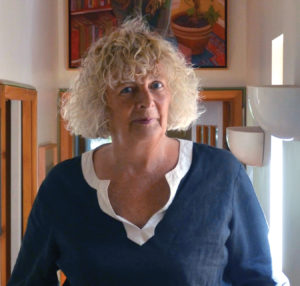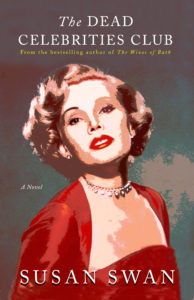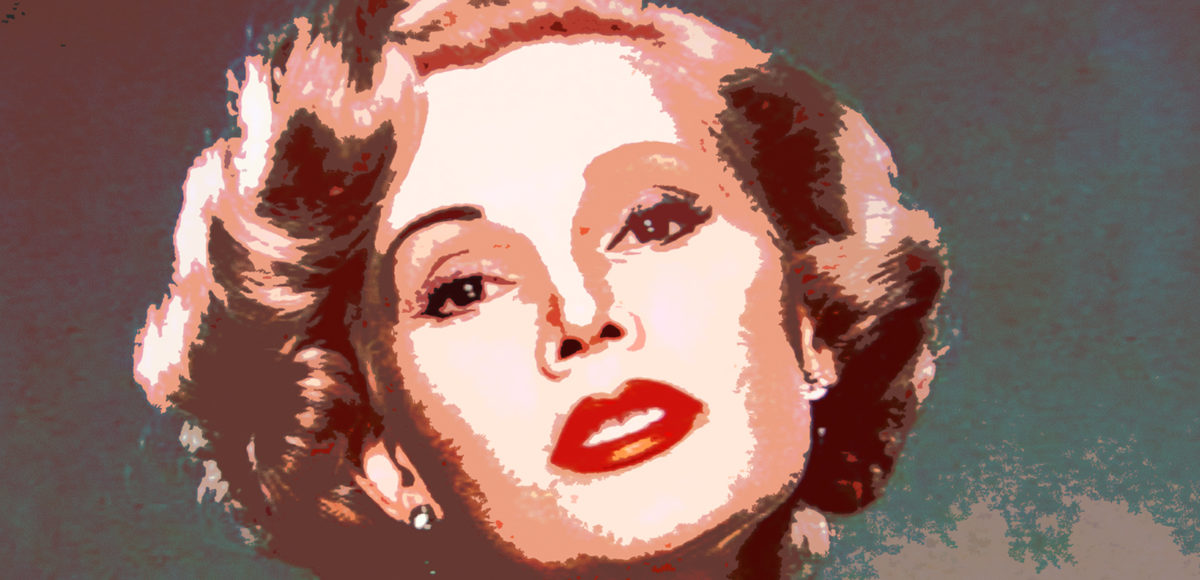Toronto author Susan Swan is obsessed with fraudsters. The obsession began more than a decade ago when Conrad Black was sentenced to the Big House in Florida. Swan wondered how prison would change him. Ideas began to flow. A novel was soon in the works.
The result is The Dead Celebrities Club (Cormorant Books), a satirical story about a Canadian hedge fund tycoon, Dale Paul, who perpetrates a terrible fraud, wiping out U.S. war veterans’ pensions, and is handed a long prison term.
Black and Dale Paul (he always uses both names) both landed in prison for white collar crime but their pathways soon diverged.

Susan Swan
Black devoted his time to tutoring fellow prisoners who lacked basic literacy skills. Dale Paul bonds with his fellow prisoners too but by having them collaborate with him in the creation of a money-making pool in which bets are placed on which old, ailing person from a list of celebrities will be the next to die. Such pools actually exist. They can be found online or among groups of regulars sitting around the back table at certain bars.
Early on in The Dead Celebrities Club, Dale Paul sheds his resemblance to Conrad Black to embrace, instead, the culture of Donald Trump.
Some big surprises come towards the end of Dead Celebrities. The ending might be just a little too pat. It definitely leaves the reader begging for more, wondering about the future of Dale Paul, just as many of us undoubtedly wonder what Conrad Black really thinks and does these days. Actually, Black is quite happy these days having just received a pardon from President Trump.
“Trump was very much on my mind” during the writing of Dead Celebrities, says Swan. “I was obsessed with him.”
Dale Paul’s business partner Earl Linquist is very much based on Trump. Dale Paul is more his own man, a far more likeable scoundrel. He is not a Trump clone but he is certainly someone who would fit perfectly in the American president’s inner circle, being ruthless, amoral and narcissistic. Watch five minutes of the talking heads on CNN and you will understand the world inhabited by Dale Paul.
Some big surprises come towards the end of Dead Celebrities. The ending might be just a little too pat. It definitely leaves the reader begging for more, wondering about the future of Dale Paul, just as many of us undoubtedly wonder what Conrad Black really thinks and does these days.
So, will there be a sequel to Dead Celebrities?
That question is put directly to Swan during an interview at the University of Ottawa. Initially, she said: “I hadn’t thought of it.” But as the hour-long interview progressed, Swan warmed to the idea. Her obsession with fraudsters was decidedly not quenched with the writing of Dead Celebrities. Indeed, Dale Paul haunts her still.

“I have lots of dreams about him. He’s in the same room with me. He’s talking to me.”
Several hours after the interview, Swan fires off an email. “I meant it when I said you got me thinking about a new story with Dale Paul as a character. Maybe I’m not finished with him. Maybe there’s still more to say. And for sure, after our conversation this afternoon, I know he’s going to show up in my dreams again.”
Dead Celebrities is something of a spoof, a satire on contemporary culture in which money and greed predominate and even ailing celebrities are commoditized, essentially turned into “poker chips.”
The black humour in the novel is a trademark of Swan’s. Consider her most celebrated novel, The Wives of Bath, about a girls’ school in Toronto terrorized by a violent transsexual.
That 1993 book, both funny and frightening, was far ahead of its time. Today everybody seems to be writing books about transsexuals. Not so in 1993. The book still earns Swan royalties. Interest remains. The Italian rights to Wives of Bath were just sold.
An even earlier Swan novel, 1983’s The Biggest Modern Woman of the World, a story based on a real-life 7-foot, six-inch giantess, is about to be made into a television series. Clearly, there is a timelessness to Swan’s writing. Or is it just that the macabre, whether it be a giantess, a murderous transsexual or a charming fraudster, is timeless?
Swan’s oeuvre is drenched in dark humour. But that does not mean her own life is lived that way.
“I’m pretty much like Dale Paul,” she says. “I’m pretty upbeat. I guess when I am writing fiction, I’m dealing with aspects of myself that don’t come into play in my ordinary life.”
So, in other words, Swan does not see herself as someone who delights in the misfortunes of others. “I’m very, very empathetic.”
She does see herself as ironic: “Maybe I’m more ironic than dark.”
A former journalist and university professor, the 73-year-old Swan is one of the country’s most ardent champions of the written word. During a long career, she has been active in various writerly groups and grassroots organizations championing literature. She laments the decline of print journalism like many of us mourn a dead relative. She cringes at a U.S. president who says the news media is the “enemy of the people.”
Despite Dale Paul being an honorary member of the Trump team, Swan learns to like him by the end of Dead Celebrities.
“Because of his love for his son, he was capable of change. I guess I could come to feel an affinity with him.”
Well, Dale Paul could change. Or could he? Swan thinks prison changed Conrad Black, but maybe just for awhile. Will Dale Paul’s changes stick? Only a sequel will tell us.







